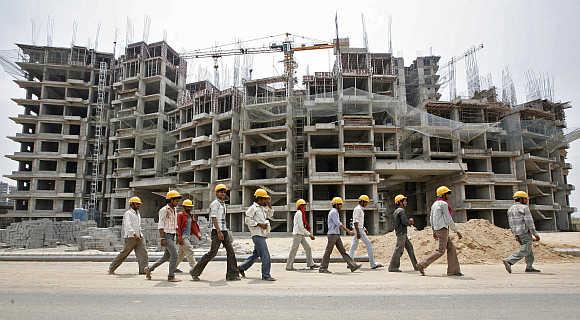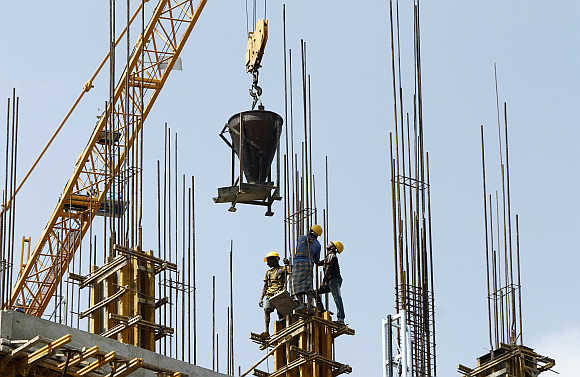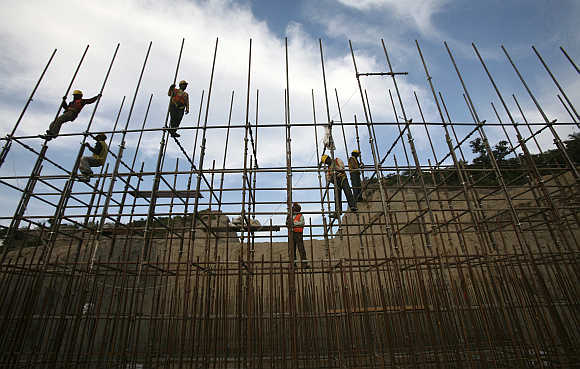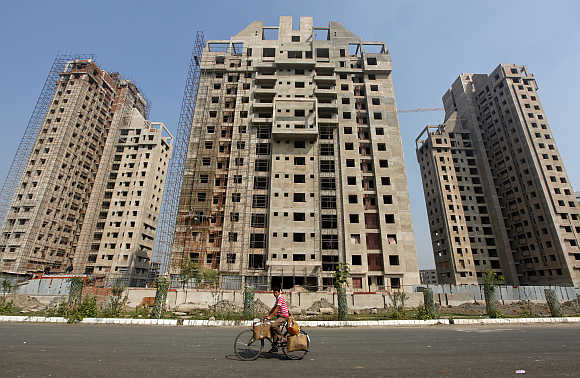Photographs: Amit Dave/Reuters Anshuman Magazine
The Union Cabinet recently approved the draft Real Estate Regulation and Development Bill. The legislation, which is yet to be approved by Parliament for its implementation across all states and Union Territories in the country, is a positive policy measure towards bringing in transparency in the unregulated real estate sector.
The essence of the Bill lies in its various provisions that support homebuyers in making informed decisions while purchasing property. Provisions such as registration of all upcoming projects with the proposed regulatory authority and releasing relevant details regarding project specifications, size, carpet area and sale details in the public domain are steps that will help clear the ambiguity surrounding residential projects by private developers.
This is likely to protect the buyers from misrepresentation, delays in delivery and failure from developers in meeting contractual obligations. So, this is an encouraging move from the government towards promoting accountability in the sector and protecting buyers from unethical business practices.
The proposed appellate tribunal is also a positive step towards addressing disputes and reducing the burden on consumer courts, while the proposed penalty imposed for default is likely to deter developers (and property agents) from duping buyers.
...
Real estate regulation Bill fails to address key issues
Image: Labourers work at the construction site of a commercial complex in Chennai.Photographs: Babu/Reuters
However, the setting up of a regulatory authority, both at national and state levels, and an appellate tribunal requires concerted administrative steps that will fructify only if the Bill is implemented effectively. Despite all these encouraging provisions in the Bill, which would be consequential for the growth of housing stock in India's urban footprint, it should have taken a more balanced view of the grievances that the developer community faces in the country.
The sector has been bogged down by a multitude of regulatory approvals that developers need to obtain before they begin construction. Approvals for building layouts, ownership, environment clearances, structural planning, utilities, among others, are time-consuming, cumbersome and often delayed.
These delays often result in an increase in project costs that ultimately trickle down to buyers. So, it is important to facilitate policy measures that streamline approval processes (both at state and national levels), which need to be built into the provisions of the Bill. India's rapid urbanisation has fuelled demand for housing and support services across the country. However, the urban limits of our cities are often constrained by slow and uneven release of land parcels for development.
...
Real estate regulation Bill fails to address key issues
Image: Workers fasten iron rods together at a construction site in Jammu.Photographs: Mukesh Gupta/Reuters
These supply bottlenecks can be resolved through concerted efforts such as permitting higher density developments by increasing floor space index norms, releasing land parcels for development on a sustained basis and encouraging private participation in land aggregation. The Bill has not taken these factors into consideration and ignores the direct linkage between project delays and administrative bottlenecks.
So, although the Bill has created a regulator to address consumer grievances, it does not hold government bodies and other authorities accountable for delays in construction activity. A key provision of the Bill is separating the funds raised for a particular project in a separate account, to be utilised for that specific project only, thereby prohibiting diversion of funds by developers.
This is likely to address the issue of delays in construction progress, especially in projects that have been launched but continue to lag in terms of completion timelines. However, this provision might impact liquidity and fund availability in the market. A cautious developer community might slow down new project launches, which would negatively impact efforts at plugging gaps in the housing shortage in most of our urban centres.
Despite all these concerns, the Bill is definitely a step in a positive direction since it is the first time that an effort has been made to regulate the unregulated real estate sector and safeguard consumer interest. This is likely to promote transparency in the sector and also establish standard practices for residential sale and purchase. It is also expected to help the sector attract attention from institutional investors and financing institutions, which, buoyed by such efforts towards enhancing transparency, would be willing to park funds in the sector.
...
Real estate regulation Bill fails to address key issues
Image: A man cycles past residential buildings under construction in Kolkata.Photographs: Rupak De Chowdhuri/Reuters
There is no doubt that India's real estate sector is poised for significant growth, thriving on opportunities such as the growth in income levels, increasing urbanisation and demand for new housing. Growth in the sector, however, is restricted by numerous challenges such as high borrowing costs, lack of institutional funding, lengthy approval processes and slow and uneven infrastructure development.
These challenges have not been addressed by the government; rather, a regulatory authority has been proposed that might have the powers to intervene even in projects that are well implemented. Hence, relevant checks and balances must be built in the present structure of the Bill to address misuse of its various provisions.
The effort on part of the government should be towards channelling the various provisions of the Bill in such a manner that they promote the growth of our built environment, rather than creating more legislative and bureaucratic hurdles for the country in meeting its housing shortage.
The author is Chairman & MD, CBRE South Asia Pvt Ltd






article